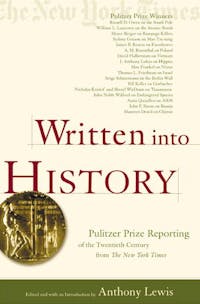Written into History
Pulitzer Prize Reporting of the Twentieth Century from The New York Times
 Download image
Download image
ISBN10: 0805071784
ISBN13: 9780805071788
Trade Paperback
384 Pages
$28.00
CA$31.50
Drawn from the New York Times's archive of an unparalleled eighty-one Pulitzer Prizes, Written Into History offers a fascinating record of the twentieth century.
The Times's award-winning reports range from Antarctic dispatches on the Byrd expedition to the eyewitness account of the atomic bomb, from the First Amendment battle to publish the Pentagon Papers to the personal narrative of an interracial friendship. Pulitzer Prize-winner Anthony Lewis culled through the newspaper's most acclaimed writing to chronicle life and history as it was happening, with such highlights as Otto Tolischus on Hitler, David Halberstam on Vietnam, J. Anthony Lukas on hippies, and Anna Quindlen on AIDS. Lewis tells the stories behind the stories, describing journalism's changing role in the world. This is a rich and memorable portrait of a century by the men and women who most artfully observed it.
Reviews
Praise for Written into History
"Dozens of classy—by turns subversive, condemning, and exploratory—pieces of journalism . . . A stellar collection."—Kirkus Reviews
"The kind of even-shaping journalism pioneered by Pulitzer is on display in Written into History, a collection of Pulitzer Prize reporting from the New York Times. Editor Anthony Lewis chronicles changes in the attitude of the press toward the presidency and government, as reflected in the kind of reporting that won the prize over the years and the trend toward recognizing more analytical writing. He also provides background on the history of the Pulitzer Prize and the arduous decision-making process. The selected award-winning articles (the Times has won more Pulitzers than any other American newspaper) are sorted into the following categories: investigative reporting; dangerous stories that put reporters at risk; international news; public advocacy; criticism of the arts; science reporting; and biographical and human-interest stories. Among the topics are Russian slave-labor camps during the 1950s, the Pentagon Papers, the Vietnam War, and exploitation of illegal aliens in the U.S."—Vanessa Bush, Booklist
"Lewis (Gideon's Trumpet), a writer with the New York Times for nearly five decades and himself a two-time Pulitzer winner succeeds in presenting some of the world's best recent journalism . . . There are plenty of both prominent and almost-forgotten stories: 'Red' Smith on the near-bankruptcy of New York City in the 1970s, Max Frankel on Nixon's 1972 visit to China, Linda Greenhouse on failed Supreme Court nominee Robert Bork. Lewis's fine introductory essay describes the post-Vietnam transformation of American journalism. The war and Watergate, he contends, made the press more skeptical of those in power and more confrontational in tone. Pulitzer Prizes increasingly went to fearless reporters like David Halberstam, whose tragically prescient analysis, in 1963, of the worsening situation in Vietnam constitutes one of the highlights of this book . . . Another highlight is Lewis's own analysis of the Warren court, which moved aggressively to 'federalize' legal protections in the areas of civil rights and criminal due process. It's a paragon of accessible legal writing. Perhaps the best, and certainly the most important, piece in the collection is Mirta Ojito's unforgettable recent story of two Cuban immigrants, one black and one white and how race comes to define and divide the two friends once they move to Miami. The piece is everything great journalism should be: empathetic, unmistakably relevant and a challenge to our basic ideals. For anyone interested in recent history or journalism at its best, this book will prove worthwhile."—Publishers Weekly
"Newspaper reporting and writing at its best . . . Many of the stories have the ring of history, but they were written as the events were still churning at the writers' elbow . . . Their words, written pretty much on the spot, have held up well over the years."—Syracuse Post-Standard


